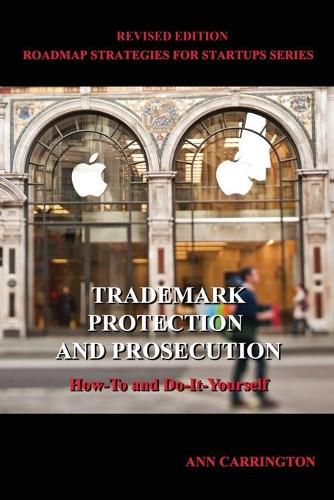Readings Newsletter
Become a Readings Member to make your shopping experience even easier.
Sign in or sign up for free!
You’re not far away from qualifying for FREE standard shipping within Australia
You’ve qualified for FREE standard shipping within Australia
The cart is loading…






This title is printed to order. This book may have been self-published. If so, we cannot guarantee the quality of the content. In the main most books will have gone through the editing process however some may not. We therefore suggest that you be aware of this before ordering this book. If in doubt check either the author or publisher’s details as we are unable to accept any returns unless they are faulty. Please contact us if you have any questions.
Ann Carrington’s new book series: Roadmap Strategies for Startups, book #2, Revised Edition - Trademark Protection and Prosecution, on sale today. A comprehensive book on trademarks, including sample filings, and much more! Because trademark rights in the U.S. are based on use, when a trademark is not used or is used incorrectly - even for a relatively short period of time - without justification, the mark may be deemed abandoned. Once abandoned, others may adopt and use the mark.
Trademarks are words, symbols, or devices used to distinguish the source or provider of goods from other providers. Trademarks are generally affixed to labels, or packaging, or used at the point of sale for goods. Service marks function similarly - but are used to identify the source of services rather than goods. Service marks typically appear in promotional, and advertising materials, along with a description of the services provided. These guidelines will use the term trademark to refer to both trademarks and service marks.
Trademarks benefit both trademark owners and consumers by indicating the source of a product or service - and distinguishing the product or services from those of competitors. Trademarks help owners establish goodwill in their company and in their product and services. Consumers are protected because trademarks help them identify the quality of a good or service associated with a trademark.
The trademarks of your company are valuable assets of your business and should be treated with care. If your trademarks are misused, your business could lose the exclusive rights to use these marks. Due to misuse, some once-famous marks are now common, everyday terms used to identify products generically - rather than the sources of those products - and the owners of those marks have been essentially stripped of their trademark rights, e.g., aspirin, harmonica, linoleum, escalator and zipper.
$9.00 standard shipping within Australia
FREE standard shipping within Australia for orders over $100.00
Express & International shipping calculated at checkout
This title is printed to order. This book may have been self-published. If so, we cannot guarantee the quality of the content. In the main most books will have gone through the editing process however some may not. We therefore suggest that you be aware of this before ordering this book. If in doubt check either the author or publisher’s details as we are unable to accept any returns unless they are faulty. Please contact us if you have any questions.
Ann Carrington’s new book series: Roadmap Strategies for Startups, book #2, Revised Edition - Trademark Protection and Prosecution, on sale today. A comprehensive book on trademarks, including sample filings, and much more! Because trademark rights in the U.S. are based on use, when a trademark is not used or is used incorrectly - even for a relatively short period of time - without justification, the mark may be deemed abandoned. Once abandoned, others may adopt and use the mark.
Trademarks are words, symbols, or devices used to distinguish the source or provider of goods from other providers. Trademarks are generally affixed to labels, or packaging, or used at the point of sale for goods. Service marks function similarly - but are used to identify the source of services rather than goods. Service marks typically appear in promotional, and advertising materials, along with a description of the services provided. These guidelines will use the term trademark to refer to both trademarks and service marks.
Trademarks benefit both trademark owners and consumers by indicating the source of a product or service - and distinguishing the product or services from those of competitors. Trademarks help owners establish goodwill in their company and in their product and services. Consumers are protected because trademarks help them identify the quality of a good or service associated with a trademark.
The trademarks of your company are valuable assets of your business and should be treated with care. If your trademarks are misused, your business could lose the exclusive rights to use these marks. Due to misuse, some once-famous marks are now common, everyday terms used to identify products generically - rather than the sources of those products - and the owners of those marks have been essentially stripped of their trademark rights, e.g., aspirin, harmonica, linoleum, escalator and zipper.